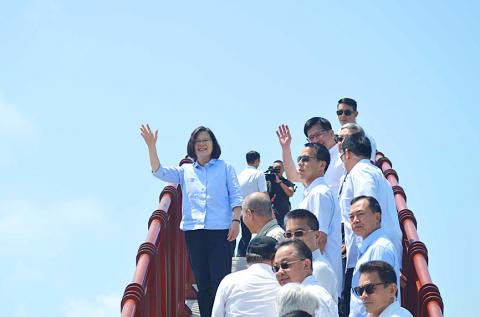President Tsai Ing-wen (蔡英文) yesterday acknowledged that she had confused the facts surrounding the purchase of the building housing the nation’s representative office in New York City during a speech she gave on Aug. 17 in Taichung, following criticism from former president Chen Shui-bian (陳水扁).
Talking about her accomplishments in her career in government, Tsai said that she had had the “boldness and vision” to buy the building that houses the Taipei Economic and Cultural Office In New York, which has “become a landmark” in the city.
The president yesterday said she was sorry that her mistake had created a disturbance, and she thanked those who brought the mistake to her attention.

Photo: CNA
During the years of the building’s planning she had been a national security team member and had taken part in many discussions involving the nation’s policies regarding its relationship to the US, Tsai said.
Part of that participation involved supporting increases in the foreign affairs budget to pay for the building, which she felt was at the front line of the nation’s diplomacy, she said.
Then-premier Yu Shyi-kun’s decision to purchase the building was the right choice, and the hard work of foreign affairs officials at the time is the main reason ties between the two nations continue to deepen today, she said.
In a Facebook post on Friday, Chen had criticized Tsai’s account of her participation in buying the building.
“That purchase was made during the time that Yu Shyi-kun was premier. [Tsai] had no part in it, and yet she can say such a thing,” he wrote.
Planning for and the establishment of the New York office took place from July 2004 to March 2005, while Tsai did not become vice premier until Jan 25, 2006 — when Premier Su Tseng-chang (蘇貞昌) replaced Yu — so she could not have had anything to do with setting up the office, he said.
The decision to buy the building, which cost NT$1.4 billion (US$44.5 million at the current exchange rate), and today is valued at NT$4.5 billion, had come from Yu, Chen wrote, adding that renovations had cost NT$300 million.
The Chinese Nationalist Party (KMT) caucus yesterday accused Tsai of “wanting to be a “’god by reaping the rewards of others’ hard work.”
“Tsai wants to take the credit for the hard work of foreign affairs officials. Is this kind of person qualified for re-election?” KMT Legislator Tung Hui-chen (童惠珍) said.

The Taiwanese passport ranked 33rd in a global listing of passports by convenience this month, rising three places from last month’s ranking, but matching its position in January last year. The Henley Passport Index, an international ranking of passports by the number of designations its holder can travel to without a visa, showed that the Taiwan passport enables holders to travel to 139 countries and territories without a visa. Singapore’s passport was ranked the most powerful with visa-free access to 192 destinations out of 227, according to the index published on Tuesday by UK-based migration investment consultancy firm Henley and Partners. Japan’s and

NATIONAL SECURITY THREAT: An official said that Guan Guan’s comments had gone beyond the threshold of free speech, as she advocated for the destruction of the ROC China-born media influencer Guan Guan’s (關關) residency permit has been revoked for repeatedly posting pro-China content that threatens national security, the National Immigration Agency said yesterday. Guan Guan has said many controversial things in her videos posted to Douyin (抖音), including “the red flag will soon be painted all over Taiwan” and “Taiwan is an inseparable part of China,” while expressing hope for expedited “reunification.” The agency received multiple reports alleging that Guan Guan had advocated for armed reunification last year. After investigating, the agency last month issued a notice requiring her to appear and account for her actions. Guan Guan appeared as required,

Japan and the Philippines yesterday signed a defense pact that would allow the tax-free provision of ammunition, fuel, food and other necessities when their forces stage joint training to boost deterrence against China’s growing aggression in the region and to bolster their preparation for natural disasters. Japan has faced increasing political, trade and security tensions with China, which was angered by Japanese Prime Minister Sanae Takaichi’s remark that a Chinese attack on Taiwan would be a survival-threatening situation for Japan, triggering a military response. Japan and the Philippines have also had separate territorial conflicts with Beijing in the East and South China

A strong cold air mass is expected to arrive tonight, bringing a change in weather and a drop in temperature, the Central Weather Administration (CWA) said. The coldest time would be early on Thursday morning, with temperatures in some areas dipping as low as 8°C, it said. Daytime highs yesterday were 22°C to 24°C in northern and eastern Taiwan, and about 25°C to 28°C in the central and southern regions, it said. However, nighttime lows would dip to about 15°C to 16°C in central and northern Taiwan as well as the northeast, and 17°C to 19°C elsewhere, it said. Tropical Storm Nokaen, currently